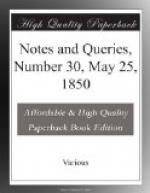“America persaepe dicitur, sed improprie, Indiae Occidentales, les Indes Occidentales, Gallis, West Inde, Belgis: Non tantum ab Hispanis, qui illam denominationem primi usurparunt, sed etiam a Belgis, Anglis, et aliquando a Francis, quod eodem fere tempore detecta sit ad occidentem, quo ad Orientem India reperta est.”—Hofmanni Lexicon Univ. 1677, sub titulo “America.”
“At eadem terra nonnullis India Occidentalis, nuncupatur, quia eodem tempore, quo India Orientalis in Asia, haec etiam delecta fuit; tum quod utriusque incolis similis ac pene eadern ivendi ratio: nudi quippe utrique agunt.”—P. Clurerii Introduct. in Univ. Geographiam, Cap. xi (iv.) 1711.
“The most improper name of all, and yet not much less used than that of America, is the West Indies: West, in regard of the western situation of it from these parts of Europe; and Indies, either as mistook for some part of India at the first discovery, or else because the seamen use to call all countries, if remote and rich, by the name of India.”—Heylyn’s Cosmography, 1677, Book iv., sub initio.
It is almost needless to mention, that India received {492} its name from the river Indus; and that Indus and [Greek: Indos] are the Roman and Greek forms of Sindo, the name it was known by among the natives.
HENRY KERSLEY.
Corpus Christi Hall, Maidstone.
[We have received many other
replies to this Query, referring
“NORTHMAN” to
Robertson’s History of America, and Humboldt’s
Aspects, &c., vol.
ii. p. 319.]
Vox Populi Vox Dei (No. 20. p. 321.).—Your correspondent “QUAESITOR” asks for the origin of the saying Vox populi Vox Dei. Warwick, in his Spare Minutes (1637), says—
“That the voice of the common people is the voice of God, is the common voice of the people; yet it is as full of falsehood as commonnesse. The cry before Pilate’s judgement-seat, ’Let him be crucified,’ was vox populi, ‘the cry of all the people.’ How far was it the voice of God?”
M.
[Mr. G. Cornewall Lewis, in his valuable Essay on the Influence of Authority in Matters of Opinion, p. 172., has some very interesting remarks upon this proverb, which, “in its original sense, appears to be an echo of some of the sentences in the classical writers, which attribute a divine or prophetic character to common fame or rumour.” See pp. 172, 173., and the accompanying Notes.]
Dutch Language (No. 24. p. 383.).—“E.V.” will find Holtrop’s Dictionary in 2 vols. one of the best. Werninck’s Pocket Dictionary is very good: also Tauchnitz’s Dutch and French (pocket): also Picard’s English and Dutch. Jansen’s is not bad. Swier’s Grammar is a good one; but I do not know whether there is any late edition. See Williams and Norgate, or Quaritch.




